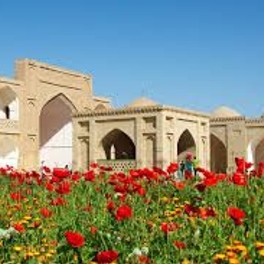Weather and Climate in Turkmenistan

Weather and Climate in Turkmenistan
Turkmenistan has a harsh desert climate, characterized by high temperatures, dryness, and strong winds. During summer, temperatures can exceed 40°C, while winter temperatures can drop to as low as -10°C. This is important for tourists planning Turkmenistan tours, as it affects both the clothing and timing of the trip. The country’s vast desert regions face water scarcity, which is particularly felt during the hot summer days.
The climate varies across Turkmenistan, with the capital, Ashgabat, and surrounding areas experiencing hot, dry summers and mild winters. In contrast, the regions near the Caspian Sea have slightly higher humidity levels. In the eastern regions, such as Turkmenabat, the heat can become even more intense. Thus, it is important for anyone planning a Turkmenistan trip to choose the right season.
Spring and autumn are the most comfortable times to visit Turkmenistan, with milder temperatures. These seasons are ideal for a Turkmenistan tour, as the weather is not overly hot, and travelers can comfortably explore the country. Spring, in particular, is a great time to visit, as it’s when the flowers bloom and nature flourishes.
Winter, however, can surprise travelers with cold and windy weather. While it rarely snows in Turkmenistan, the winds and cold temperatures can make outdoor activities uncomfortable. Therefore, those visiting Turkmenistan in winter should pack warm clothing and windbreakers.
While summer can bring extreme heat, the lower cost of Turkmenistan tour prices during this season might seem attractive, but it's crucial to take precautions when traveling in the summer. With the right preparations, such as staying hydrated and wearing appropriate clothing, travelers can manage the heat effectively.
In summary, understanding the climate and weather conditions of Turkmenistan is essential for planning an enjoyable trip. Choosing the right season for your Turkmenistan tour ensures a more pleasant and comfortable experience.
Other Contents